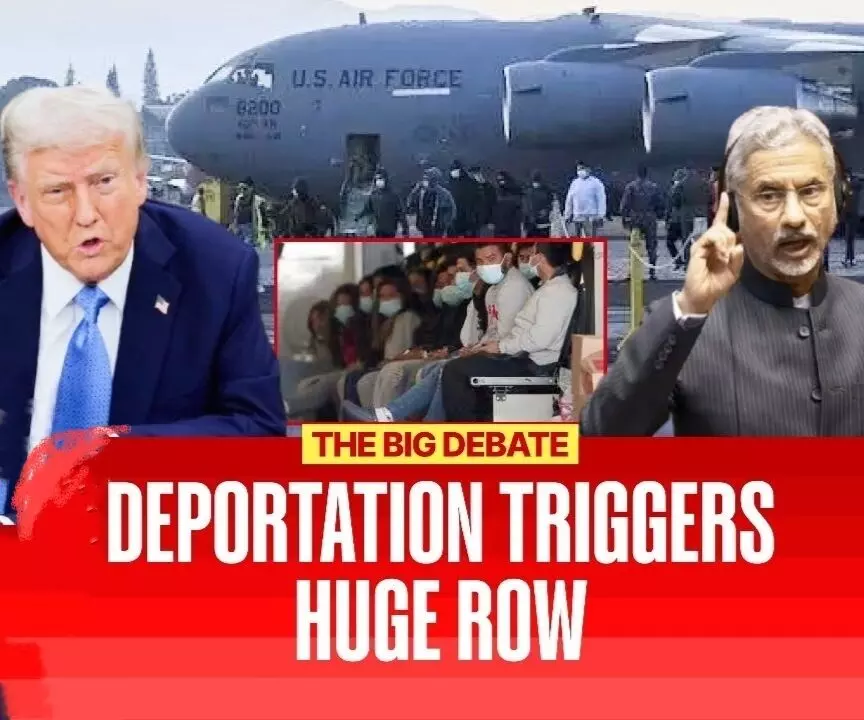India-US Relations: Deportation of Illegal Immigrants Strains Ties

The recent deportation of illegal immigrants by the United States under Donald Trump's administration has sparked a heated debate across various fronts. The external affairs minister, Dr. S. Jaishankar, responded to the situation on February 6, 2025, emphasizing that these individuals were living in the United States illegally and, therefore, had to be deported. This explanation has led to further questions and concerns from the opposition, particularly regarding the manner in which these deportations were carried out.
One of the primary arguments raised by the opposition is that the deported individuals were treated like criminals. The question arises: were these individuals scientists, corporate professionals, or any other kind of individuals who went to the United States and dedicated their efforts to contributing to American society? The answer, unfortunately, is no. These individuals migrated to the United States illegally in search of a better life with dignity. This raises the larger issue of whether any country should deport individuals who have infiltrated its borders illegally. The fundamental principle here is that these individuals were not invited or called by the host country.
India, too, has faced similar challenges with illegal infiltration. The introduction of laws such as the Citizenship Amendment Act (CAA) and the National Register of Citizens (NRC) aims to identify whether individuals are Indian citizens or not. These laws have been enacted to ensure the safety and security of the nation. Numerous instances of illegal Bangladeshi infiltrators being caught in various cities like Delhi, Pune, and Kolkata have been reported. The Indian government has taken steps to deport these individuals back to their country of origin. This begs the question: why is there such a massive uproar from political parties when it comes to dealing with illegal immigrants?
It is essential to recognize that some issues transcend politics. The Trump administration, driven by the principles of capitalism, is not primarily concerned with humanitarian grounds. The government's focus is on following the rule of law, and as such, individuals who are identified as illegal immigrants are deported regardless of their background or contributions. This approach is perceived as a lesson to the public that illegal infiltration should be stopped by other countries as well.
In this context, a new debate has emerged from Colombia. The nation has stated that it will not accept its citizens deported from the United States, arguing that these individuals are not criminals. This stance has created pressure on the American administration, which insists that these deportations are necessary to maintain the integrity of its immigration policies. The American government clarifies that it is not deporting individuals who entered the country through proper channels; those who have followed the legal process are welcomed.
The involvement of external affairs experts in this debate adds another layer of complexity. Experts argue that while the rule of law must be upheld, there must also be consideration for humanitarian aspects. Dr. Ramesh Kumar, an external affairs expert, emphasizes the need for a balanced approach. "Deporting individuals without thoroughly investigating their backgrounds and contributions to society can lead to a loss of valuable talent and human resources. It is crucial to differentiate between genuine migrants seeking a better life and those who pose a threat to national security."
Similarly, Dr. Anita Sharma, an international relations scholar, highlights the importance of bilateral agreements and diplomatic negotiations. "Countries must engage in dialogue to address the root causes of illegal migration and work towards creating sustainable solutions. Deportation should not be the only option on the table; there should be efforts to rehabilitate and reintegrate these individuals."
While the debate on deportation continues, it is evident that the issue is multifaceted. It involves legal, humanitarian, and diplomatic dimensions. The challenge lies in finding a balance that upholds the rule of law while ensuring that individuals are treated with dignity and respect. The political parties' involvement adds another layer of complexity, as they often have differing viewpoints based on their ideologies and agendas.
The deportation of illegal immigrants by the United States and the subsequent debates it has triggered highlight the complexities of immigration policies. The involvement of external affairs experts underscores the need for a balanced approach that considers legal, humanitarian, and diplomatic aspects. While countries have the right to maintain the integrity of their borders, it is crucial to address the issue with sensitivity and respect for human rights. The debate continues, but one thing is clear: finding a comprehensive solution requires collaboration and understanding among nations.
